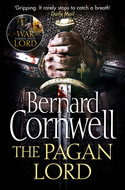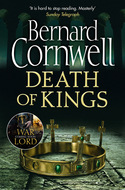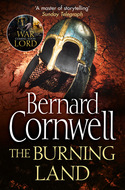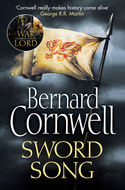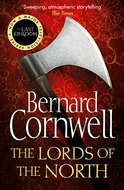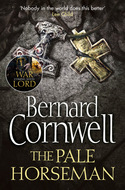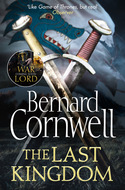Kitap dosya olarak indirilemez ancak uygulamamız üzerinden veya online olarak web sitemizden okunabilir.
Kitabı oku: «The Last Kingdom Series Books 1-6», sayfa 4
Egbert had not spoken at all, nor did he, but nor had Ivar and it was plain that the tall, thin, ghost-faced Dane was bored with the whole proceedings for he jerked his head at Ragnar who left my side and went to talk privately with his lord. The rest of us waited awkwardly. Ivar and Ragnar were friends, an unlikely friendship for they were very different men, Ivar all savage silence and grim threat, and Ragnar open and loud, yet Ragnar’s eldest son served Ivar and was even now, at eighteen years old, entrusted with the leadership of some of the Danes left in Ireland who were holding onto Ivar’s lands in that island. It was not unusual for eldest sons to serve another lord, Ragnar had two Earls’ sons in his ships’ crews and both might one day expect to inherit wealth and position if they learned how to fight. So Ragnar and Ivar now talked and Ælfric shuffled his feet and kept looking at me, Beocca prayed and King Egbert, having nothing else to do, just tried to look regal.
Ivar finally spoke. ‘The boy is not for sale,’ he announced.
‘Ransom,’ Ravn corrected him gently.
Ælfric looked furious. ‘I came here …’ he began, but Ivar interrupted him.
‘The boy is not for ransom,’ he snarled, then turned and walked from the big chamber. Egbert looked awkward, half rose from his throne, sat again, and Ragnar came and stood beside me.
‘You’re mine,’ he said softly, ‘I just bought you.’
‘Bought me?’
‘My sword’s weight in silver,’ he said.
‘Why?’
‘Perhaps I want to sacrifice you to Odin?’ he suggested, then tousled my hair. ‘We like you, boy,’ he said, ‘we like you enough to keep you. And besides, your uncle didn’t offer enough silver. For five hundred pieces? I’d have sold you for that.’ He laughed.
Beocca hurried across the room. ‘Are you well?’ he asked me.
‘I’m well,’ I said.
‘That thing you’re wearing,’ he said, meaning Thor’s hammer, and he reached as though to pull it from its thong.
‘Touch the boy, priest,’ Ragnar said harshly, ‘and I’ll straighten your crooked eyes before opening you from your gutless belly to your skinny throat.’
Beocca, of course, could not understand what the Dane had said, but he could not mistake the tone and his hand stopped an inch from the hammer. He looked nervous. He lowered his voice so only I could hear him. ‘Your uncle will kill you,’ he whispered.
‘Kill me?’
‘He wants to be Ealdorman. That’s why he wished to ransom you. So he could kill you.’
‘But,’ I began to protest.
‘Shh,’ Beocca said. He was curious about my blue hands, but did not ask what had caused them. ‘I know you are the Ealdorman,’ he said instead, ‘and we will meet again.’ He smiled at me, glanced warily at Ragnar, and backed away.
Ælfric left. I learned later that he had been given safe passage to and from Eoferwic, which promise had been kept, but after that meeting he retreated to Bebbanburg and stayed there. Ostensibly he was loyal to Egbert, which meant he accepted the overlordship of the Danes, but they had not yet learned to trust him. That, Ragnar explained to me, was why he had kept me alive. ‘I like Bebbanburg,’ he told me, ‘I want it.’
‘It’s mine,’ I said stubbornly.
‘And you’re mine,’ he said, ‘which means Bebbanburg is mine. You’re mine, Uhtred, because I just bought you, so I can do whatever I like with you. I can cook you, if I want, except there’s not enough meat on you to feed a weasel. Now, take off that whore’s tunic, give me the shoes and helmet, and go back to work.’
So I was a slave again, and happy. Sometimes, when I tell folk my story, they ask why I did not run away from the pagans, why I did not escape southwards into the lands where the Danes did not yet rule, but it never occurred to me to try. I was happy, I was alive, I was with Ragnar and it was enough.
More Danes arrived before winter. Thirty-six ships came, each with its contingent of warriors, and the ships were pulled onto the riverbank for the winter while the crews, laden with shields and weapons, marched to wherever they would spend the next few months. The Danes were casting a net over eastern Northumbria, a light one, but still a net of scattered garrisons. Yet they could not have stayed if we had not let them, but those Ealdormen and thegns who had not died at Eoferwic had bent the knee and so we were a Danish kingdom now, despite the leashed Egbert on his pathetic throne. It was only in the west, in the wilder parts of Northumbria, that no Danes ruled, but nor were there any strong forces in those wild parts to challenge them.
Ragnar took land west of Eoferwic, up in the hills. His wife and family joined him there, and Ravn and Gudrun came, plus all Ragnar’s ships’ crews who took over homesteads in the nearby valleys. Our first job was to make Ragnar’s house larger. It had belonged to an English thegn who had died at Eoferwic, but it was no grand hall, merely a low wooden building thatched with rye straw and bracken on which grass grew so thickly that, from a distance, the house looked like a long hummock. We built a new part, not for us, but for the few cattle, sheep and goats who would survive the winter and give birth in the new year. The rest were slaughtered. Ragnar and the men did most of the killing, but as the last few beasts came to the pen, he handed an axe to Rorik, his younger son. ‘One clean, quick stroke,’ he ordered, and Rorik tried, but he was not strong enough and his aim was not true and the animal bellowed and bled and it took six men to restrain it while Ragnar did the job properly. The skinners moved onto the carcass and Ragnar held the axe to me. ‘See if you can do better.’
A cow was pushed towards me, a man lifted her tail, she obediently lowered her head and I swung the axe, remembering exactly where Ragnar had hit each time, and the heavy blade swung true, straight into the spine just behind the skull and she went down with a crash. ‘We’ll make a Danish warrior of you yet,’ Ragnar said, pleased.
The work lessened after the cattle slaughter. The English who still lived in the valley brought Ragnar their tribute of carcasses and grain, just as they would have delivered the supplies to their English lord. It was impossible to read from their faces what they thought of Ragnar and his Danes, but they gave no trouble, and Ragnar took care not to disturb their lives. The local priest was allowed to live and give services in his church that was a wooden shed decorated with a cross, and Ragnar sat in judgment on disputes, but always made certain he was advised by an Englishman who was knowledgeable in the local customs. ‘You can’t live somewhere,’ he told me, ‘if the people don’t want you to be there. They can kill our cattle or poison our streams, and we would never know who did it. You either slaughter them all or learn to live with them.’
The sky grew paler and the wind colder. Dead leaves blew in drifts. Our main work now was to feed the surviving cattle and to keep the log pile high. A dozen of us would go up into the woods and I became proficient with an axe, learning how to bring a tree down with an economy of strokes. We would harness an ox to the bigger trunks to drag them down to the shieling, and the best trees were put aside for building, while the others were split and chopped for burning. There was also time for play and so we children made our own hall high up in the woods, a hall of unsplit logs with a thatch of bracken and a badger’s skull nailed to the gable in imitation of the boar’s skull that crowned Ragnar’s home, and in our pretend hall Rorik and I fought over who would be king, though Thyra, his sister, who was eight years old, was always the lady of the house. She would spin wool there, because if she did not spin enough thread by winter’s end she would be punished, and she would watch while we boys fought our mock battles with toy wooden swords. Most of the boys were servants’ sons, or slave children, and they always insisted I was the English chief while Rorik was the Danish leader, and my war-band only received the smallest, weakest boys and so we nearly always lost, and Thyra, who had her mother’s pale gold hair, would watch and spin, ever spinning, the distaff in her left hand while her right teased the thread out of the sheared fleece.
Every woman had to spin and weave. Ragnar reckoned it took five women or a dozen girls a whole winter to spin enough thread to make a new sail for a boat, and boats were always needing new sails, and so the women worked every hour the gods sent. They also cooked, boiled walnut shells to dye the new thread, picked mushrooms, tanned the skins of the slaughtered cattle, collected the moss we used for wiping our arses, rolled beeswax into candles, malted the barley and placated the gods. There were so many gods and goddesses, and some were peculiar to our own house and those the women celebrated in their own rites, while others, like Odin and Thor were mighty and ubiquitous, but they were rarely treated in the same way that the Christians worshipped their God. A man would appeal to Thor, or to Loki, or to Odin, or to Vikr, or to any of the other great beings who lived in Asgard, which seemed to be the heaven of the gods, but the Danes did not gather in a church as we had gathered every Sunday and every saint’s day in Bebbanburg, and just as there were no priests among the Danes, nor were there any relics or sacred books. I missed none of it.
I wish I had missed Sven, but his father, Kjartan, had a home in the next valley and it did not take long for Sven to discover our hall in the woods and, as the first winter frosts crisped the dead leaves and the berries shone on hawthorn and holly, we found our games turning savage. We no longer split into two sides, because we now had to fight off Sven’s boys who would come stalking us, but for a time no great damage was done. It was a game, after all, just a game, but one Sven won repeatedly. He stole the badger’s skull from our gable, which we replaced with a fox’s head and Thyra shouted at Sven’s boys, skulking in the woods, that she had smeared the fox skull with poison, and we thought that very clever of her, but next morning we found our pretend hall burned to the ground.
‘A hall-burning,’ Rorik said bitterly.
‘Hall-burning?’
‘It happens at home,’ Rorik explained. ‘You go to an enemy’s hall and burn it to the ground. But there’s one thing about a hall-burning. You have to make sure everyone dies. If there are any survivors then they’ll take revenge, so you attack at night, surround the hall, and kill everyone who tries to escape the flames.’
But Sven had no hall. There was his father’s house, of course, and for a day we plotted revenge on that, discussing how we would burn it down and spear the family as they ran out, but it was only boastful boy talk and of course nothing came of it. Instead we built ourselves a new hall, higher in the woods. It was not as fanciful as the old, not nearly so weathertight, really nothing more than a crude shelter of branches and bracken, but we nailed a stoat’s skull to its makeshift gable and assured ourselves that we still had our kingdom in the hills.
But nothing short of total victory would satisfy Sven and, a few days later, when our chores were done, just Rorik, Thyra and I went up to our new hall. Thyra span while Rorik and I argued over where the best swords were made, he saying it was Denmark and I claiming the prize for England, neither of us old enough or sensible enough to know that the best blades come from Frankia, and after a while we got tired of arguing and picked up our sharpened ash poles that served as play spears and decided to look for the wild boar that sometimes trampled through the wood at nightfall. We would not have dared try to kill a boar, they were much too big, but we pretended we were great hunters, and just as we two great hunters were readying to go into the woods, Sven attacked. Just him and two of his followers, but Sven, instead of carrying a wooden sword, swung a real blade, long as a man’s arm, the steel glittering in the winter light, and he ran at us, bellowing like a madman. Rorik and I, seeing the fury in his eyes, ran away. He followed us, crashing through the wood like the wild boar we had wanted to stalk, and it was only because we were much faster that we got away from that wicked blade, and then a moment later we heard Thyra scream.
We crept back, cautious of the sword that Sven must have taken from his father’s house and, when we reached our pathetic hut, found that Thyra was gone. Her distaff was on the floor and her wool was all speckled with dead leaves and pieces of twig.
Sven had always been clumsy in his strength and he had left a trail through the woods that was easy enough to follow and after a while we heard voices. We kept following, crossing the ridge-top where beeches grew, then down into our enemy’s valley, and Sven did not have the sense to post a rearguard who would have seen us. Instead, revelling in his victory, he had gone to the clearing that must have been his refuge in the wood because there was a stone hearth in the centre and I remember wondering why we had never built a similar hearth for ourselves. He had tied Thyra to a tree and stripped the tunic from her upper body. There was nothing to see there, she was just a small girl, only eight years old and thus four or five years from being marriageable, but she was pretty and that was why Sven had half stripped her. I could see that Sven’s two companions were unhappy. Thyra, after all, was Earl Ragnar’s daughter and what had started as a game was now dangerous, but Sven had to show off. He had to prove he had no fear. He had no idea Rorik and I were crouched in the undergrowth, and I do not suppose he would have cared if he had known.
He had dropped the sword by the hearth and now he planted himself in front of Thyra and took down his breeches. ‘Touch it,’ he ordered her.
One of his companions said something I could not hear.
‘She won’t tell anyone,’ Sven said confidently, ‘and we won’t hurt her.’ He looked back to Thyra. ‘I won’t hurt you if you touch it!’
It was then I broke cover. I was not being brave. Sven’s companions had lost their appetite for the game, Sven himself had his breeches around his ankles, and his sword was lying loose in the clearing’s centre and I snatched it up and ran at him. He somehow kept his feet as he turned. ‘I’ll touch it,’ I shouted, and I swung the long blade at his prick, but the sword was heavy, I had not used a man’s blade before, and instead of hitting where I had aimed I sliced it down his bare thigh, opening the skin, and I swung it back, using all my strength, and the blade chopped into his waist where his clothes took most of the force. He fell over, shouting, and his two friends dragged me away as Rorik went to untie his sister.
That was all that happened. Sven was bleeding, but he managed to pull up his breeches and his friends helped him away and Rorik and I took Thyra back to the homestead where Ravn heard Thyra’s sobs and our excited voices and demanded silence. ‘Uhtred,’ the old man said sternly, ‘you will wait by the pigsties. Rorik, you will tell me what happened.’
I waited outside as Rorik told what had happened, then Rorik was sent out and I was summoned indoors to recount the afternoon’s escapade. Thyra was now in her mother’s arms, and her mother and grandmother were furious. ‘You tell the same tale as Rorik,’ Ravn said when I had finished.
‘Because it’s the truth,’ I said.
‘So it would seem.’
‘He raped her!’ Sigrid insisted.
‘No,’ Ravn said firmly, ‘thanks to Uhtred, he did not.’
That was the story Ragnar heard when he returned from hunting, and as it made me a hero I did not argue against its essential untruth which was that Sven would not have raped Thyra for he would not have dared. His foolishness knew few limits, but limits there were, and committing rape on the daughter of Earl Ragnar, his father’s warlord, was beyond even Sven’s stupidity. Yet he had made an enemy and, next day, Ragnar led six men to Kjartan’s house in the neighbouring valley. Rorik and I were given horses and told to accompany the men, and I confess I was frightened. I felt I was responsible. I had, after all, started the games in the high woods, but Ragnar did not see it that way. ‘You haven’t offended me. Sven has.’ He spoke darkly, his usual cheerfulness gone. ‘You did well, Uhtred. You behaved like a Dane.’ There was no higher praise he could have given me, and I sensed he was disappointed that I had charged Sven instead of Rorik, but I was older and much stronger than Ragnar’s younger son so it should have been me who fought.
We rode through the cold woods and I was curious because two of Ragnar’s men carried long branches of hazel that were too spindly to use as weapons, but what they were for I did not like to ask because I was nervous.
Kjartan’s homestead was in a fold of the hills beside a stream that ran through pastures where he kept sheep, goats and cattle, though most had been killed now, and the few remaining animals were cropping the last of the year’s grass. It was a sunny day, though cold. Dogs barked as we approached, but Kjartan and his men snarled at them and beat them back to the yard beside the house where he had planted an ash tree that did not look as though it would survive the coming winter, and then, accompanied by four men, none of them armed, he walked towards the approaching horsemen. Ragnar and his six men were armed to the hilt with shields, swords and war axes, and their broad chests were clad in mail, while Ragnar was wearing my father’s helmet that he had purchased after the fighting at Eoferwic. It was a splendid helmet, its crown and face-piece decorated with silver, and I thought it looked better on Ragnar than it had on my father.
Kjartan the shipmaster was a big man, taller than Ragnar, with a flat, wide face like his son’s and small, suspicious eyes and a huge beard. He glanced at the hazel branches and must have recognised their meaning for he instinctively touched the hammer-charm hanging on a silver chain about his neck. Ragnar curbed his horse and, in a gesture that showed his utter contempt, he tossed down the sword that I had carried back from the clearing where Sven had tied Thyra. By rights the sword belonged to Ragnar now, and it was a valuable weapon with silver wire wrapped around its hilt, but he tossed the blade at Kjartan’s feet as though it were nothing more than a hay-knife. ‘Your son left that on my land,’ he said, ‘and I would have words with him.’
‘My son is a good boy,’ Kjartan said stoutly, ‘and in time he will serve at your oars and fight in your shield wall.’
‘He has offended me.’
‘He meant no harm, lord.’
‘He has offended me,’ Ragnar repeated harshly. ‘He looked on my daughter’s nakedness and showed her his own.’
‘And he was punished for it,’ Kjartan said, giving me a malevolent glance. ‘Blood was shed.’
Ragnar made an abrupt gesture and the hazel branches were dropped to the ground. That was evidently Ragnar’s answer, which made no sense to me, but Kjartan understood, as did Rorik who leaned over and whispered to me. ‘That means he must fight for Sven now.’
‘Fight for him?’
‘They mark a square on the ground with the branches and they fight inside the square.’
Yet no one moved to arrange the hazel branches into a square. Instead Kjartan walked back to his house and summoned Sven who came limping from under the low lintel, his right leg bandaged. He looked sullen and terrified, and no wonder, for Ragnar and his horsemen were in their war glory, shining warriors, sword-Danes.
‘Say what you have to say,’ Kjartan said to his son.
Sven looked up at Ragnar. ‘I am sorry,’ he mumbled.
‘I can’t hear you,’ Ragnar snarled.
‘I am sorry, lord,’ Sven said, shaking with fear.
‘Sorry for what?’ Ragnar demanded.
‘For what I did.’
‘And what did you do?’
Sven found no answer, or none that he cared to make, and instead he shuffled his feet and looked down at the ground. Cloud shadows raced across the far moor, and two ravens beat up to the head of the valley.
‘You laid hands on my daughter,’ Ragnar said, ‘and you tied her to a tree, and you stripped her naked.’
‘Half naked,’ Sven muttered, and for his pains took a thump on the head from his father.
‘A game,’ Kjartan appealed to Ragnar, ‘just a game, lord.’
‘No boy plays such games with my daughter,’ Ragnar said. I had rarely seen him angry, but he was angry now, grim and hard, no trace of the big-hearted man who could make a hall echo with laughter. He dismounted and drew his sword, his battle-blade called Heart-Breaker, and he held the tip towards Kjartan. ‘Well?’ he asked, ‘do you dispute my right?’
‘No, lord,’ Kjartan said, ‘but he is a good boy, strong and a hard worker, and he will serve you well.’
‘And he has seen things he should not see,’ Ragnar said, and he tossed Heart-Breaker into the air so that her long blade turned in the sun and he caught her by the hilt as she dropped, but now he was holding her backwards, as if she were a dagger rather than a sword. ‘Uhtred!’ Ragnar called, making me jump. ‘He says she was only half naked. Is that true?’
‘Yes, lord.’
‘Then only half a punishment,’ Ragnar said, and he drove the sword forward, hilt first, straight into Sven’s face. The hilts of our swords are heavy, sometimes decorated with precious things, but however pretty they appear, the hilts are still brutal lumps of metal, and Heart-Breaker’s hilt, banded with silver, crushed Sven’s right eye. Crushed it to jelly, blinding it instantly, and Ragnar spat at him then slid his blade back into its fleece-lined scabbard.
Sven was crouching, whimpering, his hands clasped over his ruined eye.
‘It is over,’ Ragnar said to Kjartan.
Kjartan hesitated. He was angry, shamed and unhappy, but he could not win a trial of strength with Earl Ragnar and so, at last, he nodded. ‘It is over,’ he agreed.
‘And you no longer serve me,’ Ragnar said coldly.
We rode home.
The hard winter came, the brooks froze, snow drifted to fill the streambeds, and the world was cold, silent and white. Wolves came to the edge of the woods and the midday sun was pale, as though its strength had been leeched away by the north wind.
Ragnar rewarded me with a silver arm ring, the first I ever received, while Kjartan was sent away with his family. He would no longer command one of Ragnar’s ships and he would no longer receive a share of Ragnar’s generosity, for now he was a man without a lord and he went to Eoferwic where he joined the garrison holding the town. It was not a prestigious job, any Dane with ambition would rather serve a lord like Ragnar who could make him rich, while the men guarding Eoferwic were denied any chance of plunder. Their task was to watch across the flat fields outside the city and to make certain that King Egbert fomented no trouble, but I was relieved that Sven was gone, and absurdly pleased with my arm ring. The Danes loved arm rings. The more a man possessed, the more he was regarded, for the rings came from success. Ragnar had rings of silver and rings of gold, rings carved as dragons and rings inlaid with glittering stones. When he moved you could hear the rings clinking. The rings could be used as money if there were no coins. I remember watching a Dane take off an arm ring and hack it to shreds with an axe, then offer a merchant scraps of the ring until the scales showed he had paid sufficient silver. That was down in the bigger valley, in a large village where most of Ragnar’s younger men had settled and where traders brought goods from Eoferwic. The incoming Danes had found a small English settlement in the valley, but they needed more space for new houses and to make it they had burned down a grove of hazels, and that was what Ragnar called the place, Synningthwait, which meant the place cleared by fire. Doubtless the village had an English name, but it was already being forgotten.
‘We’re in England to stay now,’ Ragnar told me as we went home one day after buying supplies in Synningthwait. The road was a track pounded in the snow and our horses picked a careful path between the drifts through which the black twigs of the hedge-tops just showed. I was leading the two packhorses laden with their precious bags of salt and asking Ragnar my usual questions; where swallows went in winter, why elves gave us hiccups, and why Ivar was called the Boneless. ‘Because he’s so thin, of course,’ Ragnar said, ‘so that he looks as if you could roll him up like a cloak.’
‘Why doesn’t Ubba have a nickname?’
‘He does. He’s called Ubba the Horrible.’ He laughed, because he had made the nickname up, and I laughed because I was happy. Ragnar liked my company and, with my long fair hair, men mistook me for his son and I liked that. Rorik should have been with us, but he was sick that day, and the women were plucking herbs and chanting spells. ‘He’s often sick,’ Ragnar said, ‘not like Ragnar,’ he meant his eldest son who helped hold onto Ivar’s lands in Ireland, ‘Ragnar’s built like an ox,’ he went on, ‘never gets sick! He’s like you, Uhtred.’ He smiled, thinking of his eldest son, who he missed. ‘He’ll take land and thrive. But Rorik? Perhaps I shall have to give him this land. He can’t go back to Denmark.’
‘Why not?’
‘Denmark is bad land,’ Ragnar explained. ‘It’s either flat and sandy and you can’t grow a fart on that sort of field, or across the water it’s great steep hills with little patches of meadow where you work like a dog and starve.’
‘Across the water?’ I asked, and he explained that the Danes came from a country that was divided into two parts, and the two parts were surrounded by countless islands, and that the nearer part, from where he came, was very flat and very sandy, and that the other part, which lay to the east across a great sound of water, was where the mountains were. ‘And there are Svear there too,’ he went on.
‘Svear?’
‘A tribe. Like us. They worship Thor and Odin, but they speak differently.’ He shrugged. ‘We get along with the Svear, and with the Norse.’ The Svear, the Norse and the Danes were the Northmen, the men who went on Viking expeditions, but it was the Danes who had come to take my land, though I did not say that to Ragnar. I had learned to hide my soul, or perhaps I was confused. Northumbrian or Dane? Which was I? What did I want to be?
‘Suppose,’ I asked, ‘that the rest of the English do not want us to stay here.’ I used the word ‘us’ deliberately.
He laughed at that. ‘The English can want what they like! But you saw what happened at Yorvik.’ That was how the Danes pronounced Eoferwic. For some reason they found that name difficult, so they said Yorvik instead. ‘Who was the bravest English fighter at Yorvik?’ Ragnar asked. ‘You! A child! You charged me with that little sax! It was a gutting knife, not a sword, and you tried to kill me! I almost died laughing.’ He leaned over and cuffed me affectionately. ‘Of course the English don’t want us here,’ he went on, ‘but what can they do? Next year we’ll take Mercia, then East Anglia and finally Wessex.’
‘My father always said Wessex was the strongest kingdom,’ I said. My father had said nothing of the sort, indeed he despised the men of Wessex because he thought them effete and over-pious, but I was trying to provoke Ragnar.
I failed. ‘It’s the richest kingdom,’ he said, ‘but that doesn’t make it strong. Men make a kingdom strong, not gold.’ He grinned at me. ‘We’re the Danes. We don’t lose, we win, and Wessex will fall.’
‘It will?’
‘It has a new weak king,’ he said dismissively, ‘and if he dies then his son is a mere child, so perhaps they’d put the new king’s brother on the throne instead. We’d like that.’
‘Why?’
‘Because the brother is another weakling. He’s called Alfred.’
Alfred. That was the first time I ever heard of Alfred of Wessex. I thought nothing of it at the time. Why should I have done?
‘Alfred,’ Ragnar continued scathingly. ‘All he cares about is rutting girls, which is good! Don’t tell Sigrid I said that, but there’s nothing wrong with unsheathing the sword when you can, but Alfred spends half his time rutting and the other half praying to his god to forgive him for rutting. How can a god disapprove of a good hump?’
‘How do you know about Alfred?’ I asked.
‘Spies, Uhtred, spies. Traders, mostly. They talk to folk in Wessex, so we know all about King Æthelred and his brother Alfred. And Alfred’s sick as a stoat half the time.’ He paused, perhaps thinking of his younger son who was ill. ‘It’s a weak house,’ he went on, ‘and the West Saxons should get rid of them and put a real man on the throne, except they won’t, and when Wessex falls there will be no more England.’
‘Perhaps they’ll find their strong king,’ I said.
‘No,’ Ragnar said firmly. ‘In Denmark,’ he went on, ‘our kings are the hard men, and if their sons are soft, then a man from another family becomes king, but in England they believe the throne passes through a woman’s legs. So a feeble creature like Alfred could become king just because his father was a king.’
‘You have a king in Denmark?’
‘A dozen. I could call myself king if I fancied, except Ivar and Ubba might not like it, and no man offends them lightly.’
I rode in silence, listening to the horses’ hooves crunching and squeaking in the snow. I was thinking of Ragnar’s dream, the dream of no more England, of her land given to the Danes. ‘What happens to me?’ I finally blurted out.
‘You?’ He sounded surprised that I had asked. ‘What happens to you, Uhtred, is what you make happen. You will grow, you will learn the sword, you will learn the way of the shield wall, you will learn the oar, you will learn to give honour to the gods, and then you will use what you have learned to make your life good or bad.’

